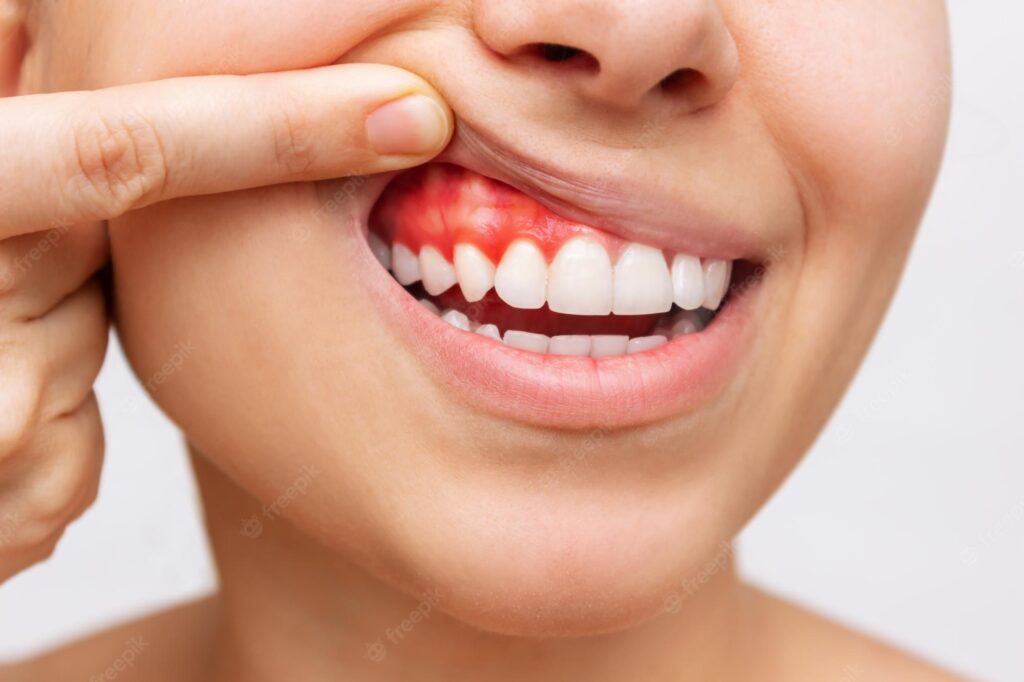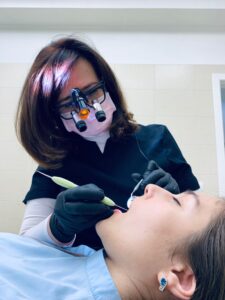Red, swollen, irritated, and bleeding gums can be signs of gum disease. If you have ongoing bleeding from your gums, it’s important you make an appointment with your dentist and have it checked out. While plaque buildup on the teeth is a common cause of gum bleeding, it can also signal something more serious. Please continue reading to find out more.
What causes bleeding gums?
The most common cause of bleeding gums is a buildup of plaque on the teeth and gum line. This causes an inflammation of the gums. In the early stages, the condition is called gingivitis. Inflamed gums can become red and swollen and may bleed.
If left untreated, the condition can progress to a more serious form of gum disease called periodontitis or periodontal disease. Along with tooth decay, periodontal disease is one of the biggest threats to dental health in the US. The Centers for Disease Control and Prevention (CDC) estimates that nearly half of all adults aged 30 years and older have some form of periodontal disease. The incidence increases with age, and 7 out of 10 adults aged 65 and above have periodontal disease.
Besides plaque buildup, other causes of gum bleeding include:
- Brushing too vigorously
- Flossing incorrectly
- Wearing ill-fitting dental appliances such as dentures
- Tooth or gum infections
- Scurvy or vitamin C deficiency
- Vitamin K deficiency
- Hormonal changes during pregnancy
- Bleeding disorders that can increase the risk of bleeding anywhere in the body
- Health conditions like blood cancers (leukemia)
- Taking certain medications such as blood thinners
How to treat bleeding gums at home?
You should not shrug off gum bleeding as a normal effect of brushing teeth. This is a serious condition that should be evaluated by a dentist. However, you can try some home remedies for bleeding gums first, such as:
Rinse your mouth
Rinsing your mouth with a disinfectant such as hydrogen peroxide or warm salt water might help to remove some plaque and control gum bleeding. Make sure you swish and spit the hydrogen peroxide solution after brushing your teeth. Don’t swallow the rinsing solution.
Increase your intake of vitamins C and K
Deficiency of vitamins C and K can lead to gum bleeding. Eating foods rich in these vitamins may help if you have bleeding gums. Foods that contain vitamin C include citrus fruits, red peppers, carrots, and sweet potatoes. Food sources of vitamin K include green leafy vegetables like kale and spinach, broccoli, lettuce, cabbage, meat, cheese, and eggs. You can also read about some of the best foods for healthy teeth.
Drink green tea
Green tea is a natural source of antioxidants like catechin. Drinking green tea on a daily basis can help to reduce the inflammatory response in periodontal disease and stop gum bleeding. You might also get relief from other inflammatory symptoms such as redness, swelling, and discomfort.
Apply a cold compress to bleeding gums
If your bleeding gums are due to minor dental trauma or injury to the gums, application of a cold compress might help to control the bleeding. You can try applying a cold compress or ice pack to your gums for 20 minutes at a time several times a day to see if it helps your bleeding gums.
How to prevent gum bleeding?
Good Oral Hygiene
The most important thing you can do to prevent gum bleeding is to practice good oral hygiene. This can prevent the buildup of plaque at the gum line, which is a leading cause of bleeding gums. Brush your teeth twice a day, morning and night, and floss once a day. Read about some common oral health mistakes and make sure you’re not making these mistakes.
Best Foods for Healthy Gums
Eat foods that support gum health, such as fiber-rich foods (fruits and vegetables) and dairy products. Drink water instead of carbonated beverages. Try to limit intake of sugary snacks between meals. Carbs and sugars encourage plaque buildup and the growth of harmful bacteria in the mouth, which in turn can lead to bleeding gums.
Smoking Cessation
Another important strategy to prevent bleeding gums is to stop smoking. Smoking lowers the body’s ability to fight infections. If you smoke, it can be harder for your body to fight plaque bacteria. This can lead to gum disease and gum bleeding.
Find a dentist for bleeding gums treatment
If your bleeding gums do not go away with home remedies, you should see a dentist to find out what’s going on. Your dentist can find out the cause of your gum bleeding and prescribe the appropriate treatment.
Express Dentist can get you same-day, after-hours, and weekend dental appointments with top-rated dentists in your area. All you have to do is call the Express Dentist toll-free hotline at 1-844-593-0591. Lines are open 24/7, including holidays. Express Dentist has carefully vetted and shortlisted leading dentists across the United States. Don’t ignore your bleeding gums. Call us today and can get instant access to high-quality dental care at affordable prices.
About the author

Dr. Greg Grillo
Dr. Greg Grillo DDS studied at the University of Washington where he received a bachelors degree with Honors and later attended dental school on the same campus. Following school Dr. Greg served in the United States Navy as a dental officer. During this time he received advanced training in specialty areas of dentistry while also treating families of members of the military.
As well as sharing valuable information on dentistry and oral health, Dr. Greg remains a practicing dentist to this day. He works with families in the Okanogan Valley where he lives with his wife and three children.
- Dr. Greg Grillo
- Dr. Greg Grillo
- Dr. Greg Grillo
- Dr. Greg Grillo
- Dr. Greg Grillo
- Dr. Greg Grillo
- Dr. Greg Grillo
- Dr. Greg Grillo
- Dr. Greg Grillo
- Dr. Greg Grillo
- Dr. Greg Grillo
- Dr. Greg Grillo
- Dr. Greg Grillo
- Dr. Greg Grillo
- Dr. Greg Grillo
- Dr. Greg Grillo
- Dr. Greg Grillo
- Dr. Greg Grillo
- Dr. Greg Grillo
- Dr. Greg Grillo
- Dr. Greg Grillo
- Dr. Greg Grillo
- Dr. Greg Grillo
- Dr. Greg Grillo
- Dr. Greg Grillo
- Dr. Greg Grillo
- Dr. Greg Grillo
- Dr. Greg Grillo
- Dr. Greg Grillo
- Dr. Greg Grillo
- Dr. Greg Grillo
- Dr. Greg Grillo
- Dr. Greg Grillo
- Dr. Greg Grillo
- Dr. Greg Grillo
- Dr. Greg Grillo
- Dr. Greg Grillo
- Dr. Greg Grillo
- Dr. Greg Grillo
- Dr. Greg Grillo
- Dr. Greg Grillo
- Dr. Greg Grillo
- Dr. Greg Grillo
- Dr. Greg Grillo
- Dr. Greg Grillo
- Dr. Greg Grillo
- Dr. Greg Grillo
- Dr. Greg Grillo
- Dr. Greg Grillo
- Dr. Greg Grillo
- Dr. Greg Grillo
- Dr. Greg Grillo
- Dr. Greg Grillo
- Dr. Greg Grillo
- Dr. Greg Grillo
- Dr. Greg Grillo
- Dr. Greg Grillo
- Dr. Greg Grillo
- Dr. Greg Grillo
- Dr. Greg Grillo
- Dr. Greg Grillo
- Dr. Greg Grillo
- Dr. Greg Grillo
- Dr. Greg Grillo
- Dr. Greg Grillo
- Dr. Greg Grillo
- Dr. Greg Grillo
- Dr. Greg Grillo
- Dr. Greg Grillo
- Dr. Greg Grillo
- Dr. Greg Grillo
- Dr. Greg Grillo
- Dr. Greg Grillo
- Dr. Greg Grillo
- Dr. Greg Grillo
- Dr. Greg Grillo
- Dr. Greg Grillo
- Dr. Greg Grillo
- Dr. Greg Grillo
- Dr. Greg Grillo
- Dr. Greg Grillo
- Dr. Greg Grillo
- Dr. Greg Grillo
- Dr. Greg Grillo
- Dr. Greg Grillo
- Dr. Greg Grillo
- Dr. Greg Grillo
- Dr. Greg Grillo
- Dr. Greg Grillo
- Dr. Greg Grillo
- Dr. Greg Grillo




